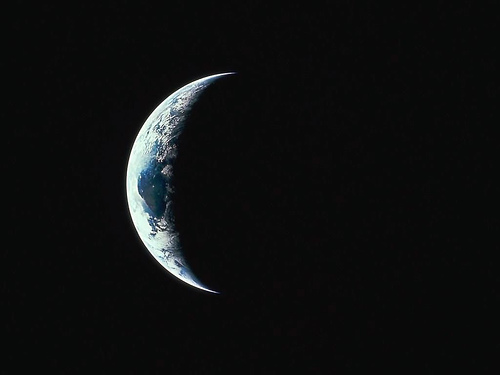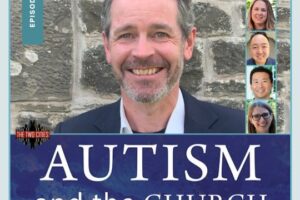For Lacan, the Real [or God] is that which breaks into our Imaginary and Symbolic constellations. The Real is a rupture. The Real cannot be imagined or symbolized, it does not occupy a place, and yet it takes place. The Real is a crack within our existing political, religious and cultural configurations, a resistance that prevents systems from claiming absolute knowledge. It is a destabilizing event that threatens to disrupt the balance maintained by our ideological commitments.
-Peter Rollins, from “God is (the) Real”
In one of the orginal manuscripts of the English poem Piers Plowman by William Langland, a small illustration appears in the margin of Manuscript Douce 104, folio 88 recto. The drawing is of a human hand holding a perfect sphere in its palm. It is an image that’s inspired by a hymn to the left of it in the text. The hymn itself is based off of Isaiah 40:12 which reads as follows: “Who has measured the waters in the hollow of his hand and marked off the heavens with a span, enclosed the dust of the earth in a measure and weighed the mountains in scales and the hills in a balance?” In light of this association, the sphere has always been interpreted as being the Earth and the hand has always been seen as being God’s.
At first this may seem like standard Christian symbology. Where the image turns traditional ideas of God on its head is in one small aspect; the shading of the sphere is such that the light is seen to be emanating away from God. In other words, the light is coming from where God is not; he seems to be residing in darkness. The idea of God residing in darkness is echoed by something theologian and philosopher Peter Rollins says in his book How (Not) To Speak of God. In his chapter entitled, “The aftermath of theology”, he introduces the idea of divine darkness. For Rollins, “this divine darkness represents a kind of supra-darkness that stands in sharp contradistinction to the sub-darkness of desolate nihilism.” He continues by saying that, “while [supra-darkness] is brought about by an absolute excess of light, [sub-darkness] results from a total absence; while [supra-darkness] represents a higher form of unknowing that subverts reasoning, the other signals mere ignorance. (Rollins, 29)
In light of God being in darkness, of his being inaccessible by means of human language, how then shall we speak of God? For Rollins the answer involves the realization that attempting to speak of God requires that one describe what happened “in an intimate encounter [with God] rather than [describe] some objective fact: religious truth is thus that which transforms reality rather than that which describes it” (Rollins, 24). Therefore the only way one can really speak of God is, as Rollins says, by using, “the most beautiful language available—the language of parables, prose and poetry” (Rollins, 44).
If this is true, then the question then becomes for the person of faith, how will you speak of God? Where have you experienced of the divine? From whence does your faith originate? What follows are my experiences as filtered through my understanding of the God as the Real; that which is, “a rupture”, that which is “a crack within our existing political, religious and cultural configurations, a resistance that prevents systems from claiming absolute knowledge.” The moment in which God becomes “a destabilizing event that threatens to disrupt the balance maintained by our ideological commitments.” These are some moments of my subjective destabilization; recordings of the cracks in my various ideological configurations.
*
When I first met God, he was superimposed onto a piece of felt cloth. He looked down at me from a board alongside his scantily clad creations, Adam, Eve. It was the middle of the summer and I was attending the weeklong church extravaganza known as Vacation Bible School. We were inside the church, in one of the classrooms. The Vacation Bible School teacher who was explaining how Eve threw the world into disarray when she took the fruit of the tree to Adam and had him eat it, thereby bringing sin and destruction into the world. In my five-year-old mind, this was not an event in deep history or a scene from a mythological tale; this moment of human weakness had just happened and the ramifications of Eve’s decision were apparent in every single area of my young life. Whenever I didn’t listen to my parents and got in trouble, it was ultimately because of what happened in the Garden; if I hit my sister, it was because Eve listened to the cunning words of the serpent; every time I hated the boy next to me because he got more Teddy Grahams than I did, it was because Adam shirked his God given duties as a man and ate the fruit when he knew he shouldn’t have.
As I watched the VBS teacher place more and more felt characters onto the board, she moved into her closing sales pitch. She presented the idea of hell to us; a place where we would go because of what happened in the Garden and the bad things we did every day; fire, brimstone and everlasting separation from our Creator awaiting us in our current sinful states. Reading the fear and trembeling on our faces, she said with a smile, that all was not lost; God changed the game. He sent his son, Jesus to die so that we could be in heaven with him. There was only one catch, though. We would have to pray a prayer that said we believe in him.
Now, she said crossing her arms. Do you all want to go to heaven or to hell?
The answer for all of us was obvious. I prayed the prayer and followed the directions to initial on the line here, here and here. Congratulations were in order; I had just purchased my first heavenly home.
When I got to my earthly one, I was playing outside with a neighbor who was also my age. As we played, I realized that perhaps he didn’t know the story I had just heard at church. Perhaps he was unaware of the stakes. I proceeded to tell him everything I’d just heard, and ended with the sales pitch that had been so convincingly made to me. He agreed that it sounded like a good idea to take Jesus up on his offer and asked what he needed to do to avoid the fires of hell. I led him through the prayer I had just prayed myself and he ran home to tell his parents the Good News. I later found out that his parents worshipped a fat god with a around bell around which his followers set fruits and candies as symbols of their love and commitment. He was no longer allowed to play with me after that.
*
I first heard God in a cold night in January. I was seven. It was the middle of the night and someone was knocking on my door. At first I thought it was a dream, but realized, as it continued that it was, in fact coming from my bedroom door. As the knocking continued, I remembered the words of Jesus I had heard countless times in Sunday School: “Behold I stand at the door and knock! If anyone hears my voice and opens the door, I will come in and eat with that person and they with me.” I had memorized the verse in order to earn a gold star sticker that I placed in the front of my Precious Moments Bible, next to all the other gold stickers just like it. As the knocking continued, I sat up in bed.
“Come in?” I said. The knocking continued.
“Come in!” The knocking continued.
“COME IN!” I yelled at the top of my voice. The knocking stopped and everything was still.
The next morning, at breakfast, my parents had the news on; the anchors were talking about an earthquake that occurred during the night in a place called Northridge. It had caused the earth to move and shake beneath our feet; in some places buildings had collapsed and some people had died. My younger sister had slept through the entire thing.
*
I saw God on the labor and delivery floor when my son was born. It was not a mystical vision of a thorn crowned Christ, or of his Blessed Mother. There was no metaphysical manifestation of the divine; no hands, feet, teeth, hair that formed the God the Hebrews called YHWH, the name that cannot be named.
What I saw was God happening live and in person; I saw love give birth to another being out of that love through pain, suffering and struggle. God was in this moment of pain and creation as he was in Genesis. This must have been a moment of pain and groaning for the divine. For in the moment of creation, God created room within his own Self for us, scooping out a portion of his being to bequeath to us to do with as we choose.
While I was not there when the cosmos emanated from a single fixed point, I do think that if it was anything like what I saw on that warm afternoon in June, then the moment nihlo became everything we know and love must have been pretty f—ing amazing. Perhaps so amazing, that the moment of creation was the first time God cried; perhaps he looked on us and realized that we were his and our own all at once, able to love and hate, live and languish and could do nothing but cry, his tears gathering at the base of mountains until they formed oceans, made salty by the evidence of his insistent yearning for you and for me.





1 Comment
Leave your reply.